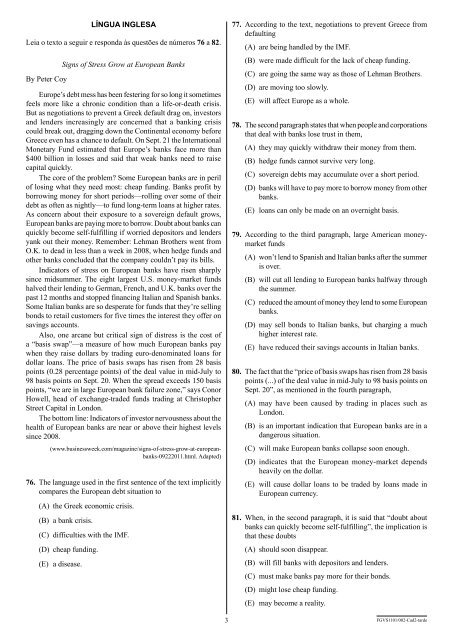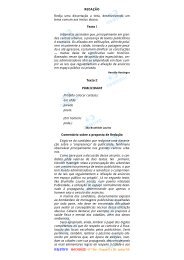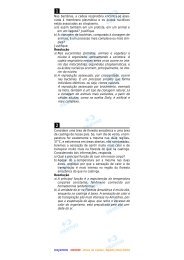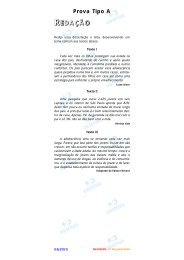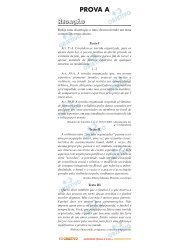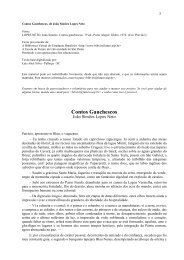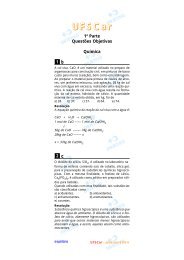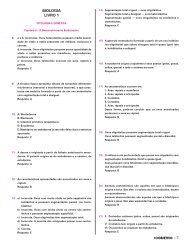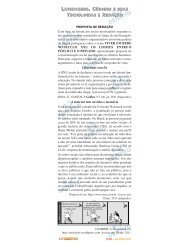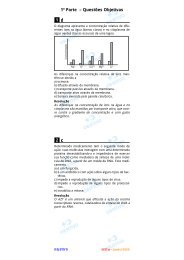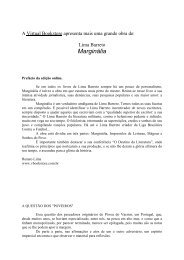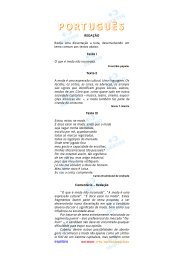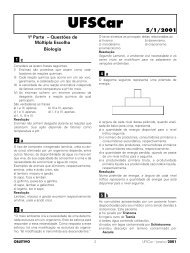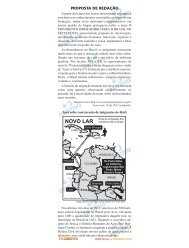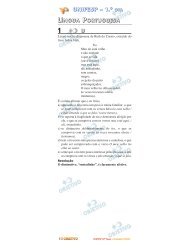001. Caderno 1 Provas da 1.a Fase Matemática ... - Curso Objetivo
001. Caderno 1 Provas da 1.a Fase Matemática ... - Curso Objetivo
001. Caderno 1 Provas da 1.a Fase Matemática ... - Curso Objetivo
You also want an ePaper? Increase the reach of your titles
YUMPU automatically turns print PDFs into web optimized ePapers that Google loves.
Língua IngLesa<br />
Leia o texto a seguir e respon<strong>da</strong> às questões de números 76 a 82.<br />
By Peter Coy<br />
Signs of Stress Grow at European Banks<br />
Europe’s debt mess has been festering for so long it sometimes<br />
feels more like a chronic condition than a life-or-death crisis.<br />
But as negotiations to prevent a Greek default drag on, investors<br />
and lenders increasingly are concerned that a banking crisis<br />
could break out, dragging down the Continental economy before<br />
Greece even has a chance to default. On Sept. 21 the International<br />
Monetary Fund estimated that Europe’s banks face more than<br />
$400 billion in losses and said that weak banks need to raise<br />
capital quickly.<br />
The core of the problem? Some European banks are in peril<br />
of losing what they need most: cheap funding. Banks profit by<br />
borrowing money for short periods—rolling over some of their<br />
debt as often as nightly—to fund long-term loans at higher rates.<br />
As concern about their exposure to a sovereign default grows,<br />
European banks are paying more to borrow. Doubt about banks can<br />
quickly become self-fulfilling if worried depositors and lenders<br />
yank out their money. Remember: Lehman Brothers went from<br />
O.K. to dead in less than a week in 2008, when hedge funds and<br />
other banks concluded that the company couldn’t pay its bills.<br />
Indicators of stress on European banks have risen sharply<br />
since midsummer. The eight largest U.S. money-market funds<br />
halved their lending to German, French, and U.K. banks over the<br />
past 12 months and stopped financing Italian and Spanish banks.<br />
Some Italian banks are so desperate for funds that they’re selling<br />
bonds to retail customers for five times the interest they offer on<br />
savings accounts.<br />
Also, one arcane but critical sign of distress is the cost of<br />
a “basis swap”—a measure of how much European banks pay<br />
when they raise dollars by trading euro-denominated loans for<br />
dollar loans. The price of basis swaps has risen from 28 basis<br />
points (0.28 percentage points) of the deal value in mid-July to<br />
98 basis points on Sept. 20. When the spread exceeds 150 basis<br />
points, “we are in large European bank failure zone,” says Conor<br />
Howell, head of exchange-traded funds trading at Christopher<br />
Street Capital in London.<br />
The bottom line: Indicators of investor nervousness about the<br />
health of European banks are near or above their highest levels<br />
since 2008.<br />
(www.businessweek.com/magazine/signs-of-stress-grow-at-europeanbanks-09222011.html.<br />
A<strong>da</strong>pted)<br />
76. The language used in the first sentence of the text implicitly<br />
compares the European debt situation to<br />
(A) the Greek economic crisis.<br />
(B) a bank crisis.<br />
(C) difficulties with the IMF.<br />
(D) cheap funding.<br />
(E) a disease.<br />
3<br />
77. According to the text, negotiations to prevent Greece from<br />
defaulting<br />
(A) are being handled by the IMF.<br />
(B) were made difficult for the lack of cheap funding.<br />
(C) are going the same way as those of Lehman Brothers.<br />
(D) are moving too slowly.<br />
(E) will affect Europe as a whole.<br />
78. The second paragraph states that when people and corporations<br />
that deal with banks lose trust in them,<br />
(A) they may quickly withdraw their money from them.<br />
(B) hedge funds cannot survive very long.<br />
(C) sovereign debts may accumulate over a short period.<br />
(D) banks will have to pay more to borrow money from other<br />
banks.<br />
(E) loans can only be made on an overnight basis.<br />
79. According to the third paragraph, large American moneymarket<br />
funds<br />
(A) won’t lend to Spanish and Italian banks after the summer<br />
is over.<br />
(B) will cut all lending to European banks halfway through<br />
the summer.<br />
(C) reduced the amount of money they lend to some European<br />
banks.<br />
(D) may sell bonds to Italian banks, but charging a much<br />
higher interest rate.<br />
(E) have reduced their savings accounts in Italian banks.<br />
80. The fact that the “price of basis swaps has risen from 28 basis<br />
points (...) of the deal value in mid-July to 98 basis points on<br />
Sept. 20”, as mentioned in the fourth paragraph,<br />
(A) may have been caused by trading in places such as<br />
London.<br />
(B) is an important indication that European banks are in a<br />
<strong>da</strong>ngerous situation.<br />
(C) will make European banks collapse soon enough.<br />
(D) indicates that the European money-market depends<br />
heavily on the dollar.<br />
(E) will cause dollar loans to be traded by loans made in<br />
European currency.<br />
81. When, in the second paragraph, it is said that “doubt about<br />
banks can quickly become self-fulfilling”, the implication is<br />
that these doubts<br />
(A) should soon disappear.<br />
(B) will fill banks with depositors and lenders.<br />
(C) must make banks pay more for their bonds.<br />
(D) might lose cheap funding.<br />
(E) may become a reality.<br />
FGVS1101/002-Cad2-tarde


